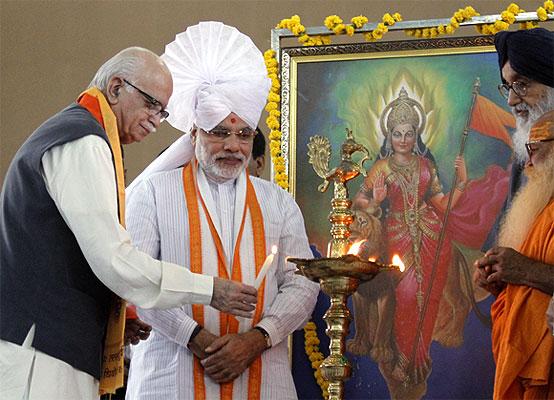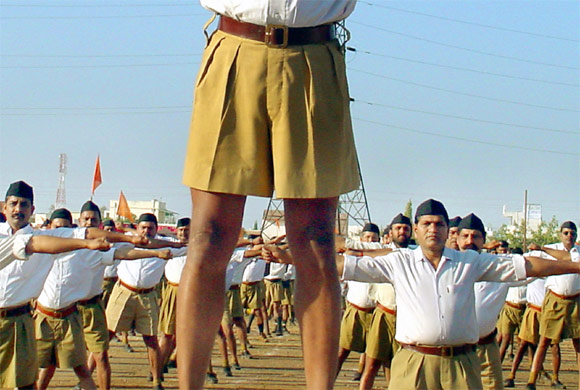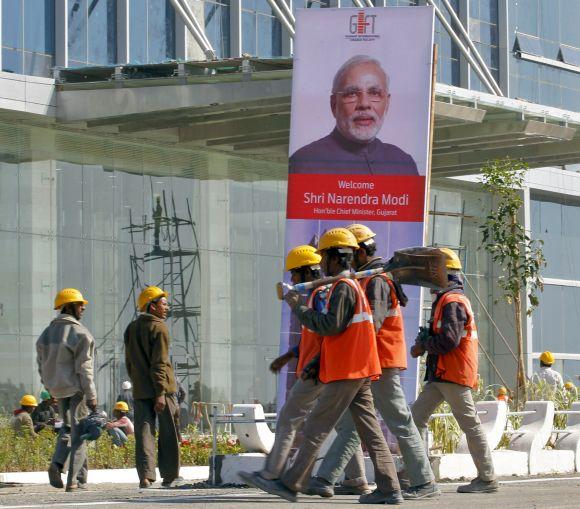For Narendra Modi, the man who will be India's next prime minister, it has been a remarkable journey to the top during which he has been pilloried by his critics and adored by his supporters who believe he will pull India out of the rut.
"I believe God has chosen me," Modi had said in the course of his relentless and focused election campaign that has catapulted him to the pinnacle of power.
The 63-year-old BJP leader himself saw a combination of a very strong anti-Congress wave "together with an equally strong wave for BJP and its NDA partners" during the marathon campaign and seized upon these to decimate the UPA.
Dismissing charges of being authoritarian, Modi told PTI during the campaign that he believed in team work and that those who worked with him believed that he was strong-willed and decisive.
He accused his opponents of resorting to "vague, non-specific and subjective things like saying that I am authoritarian, jingoistic, divisive". There had never been any serious allegation of corruption, nepotism or incompetence against him, he said.
A rank outsider to the 'Delhi club', the Gujarat chief minister, steamrolled all opposition within and outside to secure for BJP a majority that no party could get after Rajiv Gandhi's '400 plus' victory in 1984.
...
Modi: The remarkable journey of India's next prime minister
On the victory path, Modi virtually blanked out all others in the party and became its sole face in a long campaign that started last summer after he was made the campaign chief in Goa.
Undeterred by the sulk of veterans like L K Advani and grumblings of some others, the 63-year-old former RSS pracharak mounted an untiring campaign criss-crossing the country helping BJP record its finest-ever performance in more than three decades of its existence.
There was more sulk when he was anointed the BJP's prime ministerial face in September but that did not deter him from his mission in getting the BJP-led NDA back to power from where it was dislodged in 2004.
In the beginning, there were doubts whether Modi can equal the charm of Atal Bihari Vajpayee, considered a moderate even by his rivals, in attracting allies.
But the BJP put all its eggs in the Modi basket, a gamble that has paid with Modi attracting more allies pre-poll, including those who had left the NDA blaming him for the 2002 riots.
He may be one of the most riled leaders described variously as divisive, polarising and and a Hindutva-hardliner given the backdrop of the riots that had claimed over 1000 lives, mostly Muslims, in March, 2002 under his watch.
...
Modi: The remarkable journey of India's next prime minister
Photographs: Raj Patidar/Reuters
But Modi is seen by his supporters as a "strong leader" who will not play the politics of appeasement of any section.
In the 12 years he had been chief minister in Gujarat, he consciously crafted an image of a man with an alternative vision of governance for a country caught in a policy paralysis in the last few years.
With his development as his campaign plank, he made an instant connect with young voters, middle class and those in rural areas yearning for a change. But occasionally there were hints of polarising voters raking up pet issues of the saffron forces.
A master strategist, Modi has come a long way from selling tea at railway station for his father to emerge as a pan India leader. There are many of his critics who contest his claim of having sold tea.
In a state the sangh parivar called the "Hindutva laboratory", the chief minister consolidated his image as a hardliner and election after election he delivered results for the party--scoring a hat trick last year in the Assembly polls.
In his attempt to reach out to minorities, especially the Muslims, he consciously shed the hardliner approach and focused on development, including those of the poor in the Muslim community.
He battled all odds to emerge as BJP's prime ministerial candidate pipping Advani among others. But since then he had run a very clever, spirited and never-before-seen high-tech campaign addressing more than 450 rallies across the country.
Having been born in a backward 'Modh Ghanchi' (oil crusher) community in historical Vadnagar town of Mehasana district years), the rise of Modi is phenomenal. However, his status as a person belonging to backward community itself has also been contested.
The RSS pracharak, who was loaned to BJP in 1985, remained a backroom party office-bearer and key strategist till he was made chief minister of Gujarat to replace Keshubhai Patel in October 2001.
...
Modi: The remarkable journey of India's next prime minister
Just 5 months after he took over as chief minister, Modi controversially came into limelight in the wake of 2002 riots triggered after 59 'Kar Sewaks' were killed in a fire in a compartment in Sabarmati Express train incident on February 27, 2002.
His detractors accused Modi of inaction during riots, but all the subsequent investigations, including one directly under the supervision of Supreme Court-appointed Special Investigations Team and subsequent court ruling have given clean chit to Gujarat chief minister.
Modi has also been under repeated attack over alleged fake encounters and his close aide Amit Shah is under a cloud in a few of these.
But Modi mastered the art of converting adversities into opportunities. He did some pioneering work in Gujarat to win subsequent elections in 2007 and 2012 on developmental politics decimating Congress.
Modi has been claiming credit for bringing the issue of development to centre stage in his efforts to reinvent himself.
After the Supreme Court-appointed SIT gave a clean chit to him in the 2002 riots, Modi undertook a 'Sadbhavna' fast to reach out to Muslims of Gujarat as some kind of penance by going on a three-day fast in Ahmedabad. Similar fasts were also undertaken by him in Gujarat's other cities.
Modi has been tom toming Gujarat model of development, including his government's 'open arms' welcome pro industry, which has its own critics.
Business leaders have pitched for him as prime minister as they feel he is a decisive leader especially against the backdrop of policy paralysis that marked the UPA II's tenure.
In one of the events, he refused to wear a skull cap offered by a Muslim cleric, an issue that had cropped up in the current elections. But he fobbed off all criticism saying he would not follow his rivals' politics of symbolism.
Inspired by life and teachings of Gautam Buddha and Swami Vivekananda, Modi had left his Vadnagar home as a youth and joined the RSS as a pracharak. At a tender age he used to sell tea, first at the railway station of his village where his father had a tea stall and later at the canteen of Ahmedabad city bus terminal.





article